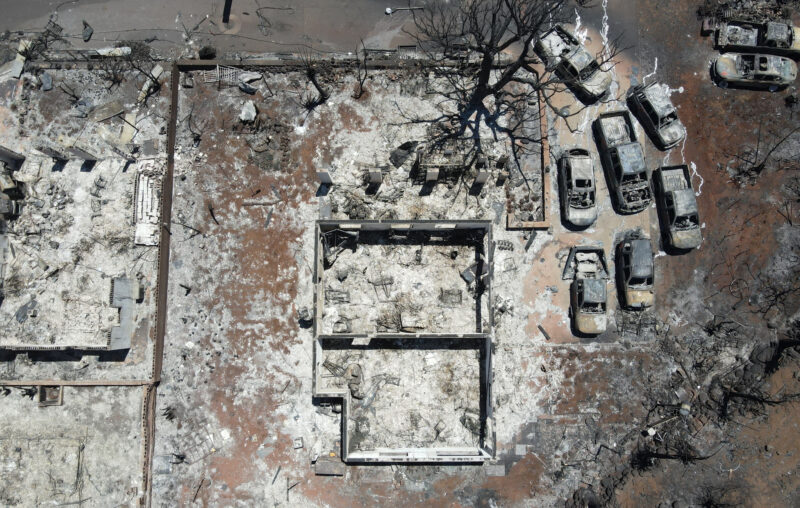
Per week after the devastating wildfires on Maui, accusations for who and/or what was in charge for the catastrophe are sweeping via the media quicker than the flames that destroyed the historic city of Lahaina. The will to hunt blame is a pure human intuition. Certainly, discovering fault may be helpful in figuring out the supply of significant issues that we hope to keep away from sooner or later. Nonetheless, as punitive motion is more likely to comply with, it is necessary that we “get it proper” in the case of assigning blame correctly.
Political financial system could also be of help right here, notably if we think about the multi-dimensional nature of the coverage selections and trade-offs that have been imposed on key actors within the occasions that unfolded.
What or Who Was to Blame?
The fireplace that ultimately destroyed Lahaina seems to have began simply after midnight (Hawai’ian time) on August 8. Whereas it was decided initially to be contained by round 9:00 am, a flare-up occurred later that afternoon and unfold shortly into the city. The majority of the harm to Lahaina occurred that night after 5:00 pm.
Losing no time in pointing fingers, media pundits started in charge world warming inside 24 hours (see right here and right here). Hawaii’s governor Josh Inexperienced asserted this trigger shortly thereafter.
Thankfully, cooler heads started to prevail and different causes for the conflagration have been provided, together with the presence of invasive grasses which are extra susceptible to fireside and particular meteorological patterns that produced excessive winds that aren’t unusual on the islands this time of the yr. College of Washington meteorologist Cliff Mass supplied an in depth clarification of the short-term climate (not long-term local weather) situations that created an ideal storm for the fires. Satirically, a wetter and cooler spring in Maui (not predicted by the local weather catastrophe fashions) allowed for in depth progress of grasses that grew to become extremely flammable within the drier summer time season.
Whereas the presence of dry grass and robust winds clarify the what of the catastrophe, the query of whether or not any human motion (i.e., the who) was accountable nonetheless stays to be answered.
As of August 19, the most probably and proximate clarification for the way the fireplace began pertains to sparks from powerlines that have been blown over throughout the excessive wind occasion. Whereas unintended catastrophes are a actuality of life which are troublesome to keep away from fully, accusations that the powerlines weren’t correctly maintained got here to the forefront shortly.
In a Wall Avenue Journal article printed on August 17, Katherine Blunt revealed that Hawaiian Electrical, the general public utility serving Maui, had identified in regards to the insufficient situation of their utility poles for no less than 4 years. The devastating Camp Fireplace catastrophe in Paradise, California in 2018 and ensuing lawsuits served as a warning for quite a few electrical utility firms in fire-prone areas (of which the western shores of Maui is one).
So, it appears now as if a villain to this tragedy has been recognized: Hawaiian Electrical. That firm has shortly develop into the “who in charge.” Granted, others have been enveloped within the “blame recreation” concerning the response to the catastrophe. Maui’s Emergency Administration Company chief resigned on August 18 after heavy criticism for not issuing a warning to Lahaina residents shortly sufficient. When it comes right down to the preliminary trigger of the fireplace, nonetheless, it seems that Maui’s utility firm was the entity most liable for the catastrophe.
Political Economic system Widens the Scope of Blame
It’s turning into clear that Hawaiian Electrical (HE) shares some accountability for the fireplace. The inevitable lawsuits will decide how a lot of that accountability the corporate will shoulder legally. However may there be extra blame to be distributed?
The aforementioned Wall Avenue Journal article on the position of HE revealed a priceless clue as to why the corporate could have been so gradual in updating their utility poles and different infrastructure:
Since PG&E’s chapter [resulting from the Camp Fire tragedy], Hawaiian Electrical has made reference in regulatory filings to the dangers of power-line fires, however it waited years to take important motion, paperwork and interviews present. Throughout that interval, the corporate was enterprise a state-mandated shift to renewable power [emphasis added].
Learn that once more; it’s necessary. Hawaiian Electrical knew about their growing older utility line infrastructure, however they have been making an attempt to adjust to authorities mandates to shift to sources of sustainable energy.
Whereas it’s troublesome, if not not possible, to learn the intentions of different folks, my greatest guess is that not one of the executives at HE needed their powerlines to trigger a significant wildfire that killed tons of. In an ideal world with limitless sources, these executives most probably would have needed to exchange growing older utility poles, trim away flammable grasses, and invested in geothermal energy applied sciences.
However we don’t dwell in an ideal world. And we don’t have limitless sources (notably within the short-term). As such, we have to prioritize our actions and make trade-offs.
If the leaders of HE knew in regards to the issues with their growing older infrastructure (and notably the utility poles) why didn’t they take motion? The reply could also be that as a public utility, accountable to a governing board and political stress, they confronted repeated calls to interact in insurance policies that have been on the highest of politician’s agendas.
Replete with stunning seashores, mountains, and plush forests, Hawaii not surprisingly has a really sturdy environmental motion. With “local weather change” making headlines every day, and efforts to “save the planet” manifesting in insurance policies as trivial as banning plastic straws, it’s completely comprehensible that HE’s board of administrators would divert funding and manpower to efforts that performed properly within the media.
Authorities mandates to put money into renewable power meant that one thing else must be de-emphasized. That one thing seems to have been utility pole upkeep. There’s a sure cost-benefit logic to this. If that you want to substitute poles and powerlines, however usually are not certain the place to start out, simply wait till one set of poles tumbles over after which substitute these. (Dwelling in a area with frequent windstorms and above-ground powerlines, I do know this logic properly.)
This means a way more difficult story in the case of assigning blame. Though with 20/20 hindsight we will see that utility poles ought to have been shored as much as stand up to higher winds, the political stress to put money into sustainable power made it tougher to handle this situation with the restricted sources HE operates beneath. (There could have additionally been the ever present COVID-era employees shortages which have plagued almost each trade. Merely put, telling everyone to remain house and even paying folks to take action may have put a pinch on HE’s accessible workforce.)
As an apart, I ought to be aware that HE executives could also be culpable within the unfold of the fireplace with their choice to not shut down energy early within the windstorm. Whether or not that was thought-about and what different components – together with political stress – performed a task will doubtless be revealed within the authorized instances that can ensue. Nonetheless, if blame is positioned on HE for not updating their utility strains, the broader context of the trade-offs that there have been impelled to make must also take heart stage.
Politics Is Ceaselessly One-Dimensional, Commerce-Offs Uncared for
If there’s a broader lesson to be discovered right here it’s that governmental coverage selections have penalties that transcend the speedy situation they’re addressing. Pushing sources in a single course implies that sources won’t be accessible in others.
Too usually (if not all the time), politicians will stump on the necessity to resolve some sizzling matter situation of the day. They could very properly put a price ticket on the efforts to resolve the going downside. That is how coverage is performed in one-dimension. If we wish to scale back vehicle carbon emissions, we have to subsidize electrical autos. That may price, let’s say, $50 billion. Downside solved, proper?
The important thing query, although, is what different makes use of may that $50 billion gone in the direction of? What are the chance prices? The troublesome trade-offs that have to be made? That’s the multi-dimensional query that politicians usually keep away from. (As Sean Mullholland and I lately argued, mandating the manufacturing of electrical autos could also be killing the entrepreneurial incentive to create different gasoline autos which are straightforward to gasoline and function.)
Parsing out issues and providing easy options is the forex of electoral politics. Whereas skilled bureaucrats could also be tasked with conducting cost-benefit analyses of various coverage choices, weighing the trade-offs, after which sending their stories off to legislatures to think about, the temptation of politicians to disregard these analyses is excessive. Making large and easy guarantees is the straightforward a part of politics. Telling constituencies that there could also be troublesome and painful trade-offs is troublesome.
Coverage is greatest thought-about in gentle of trade-offs. Coverage is multi-dimensional. Sadly, politics is one-dimensional. Discovering the one villain in charge for a tragedy makes for good political theater and may whip up votes for elected officers. Sadly, by ignoring the trade-offs that their very own insurance policies create, those self same politicians could escape the portion of the blame that they rightfully bear.
The residents of Maui deserve a full accounting of the tragedy that befell them. Considering actually in regards to the penalties of public coverage and the trade-offs that resulted is what their elected leaders owe them.


